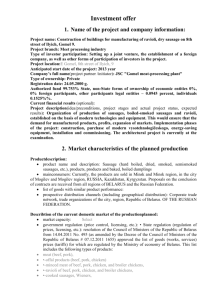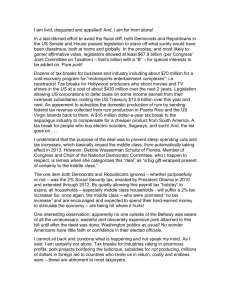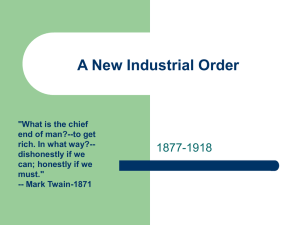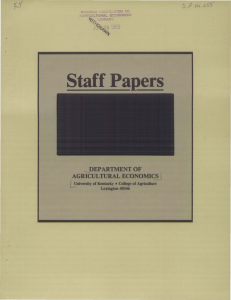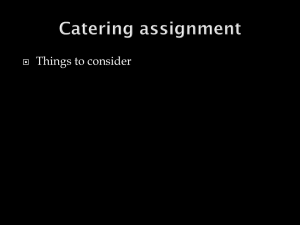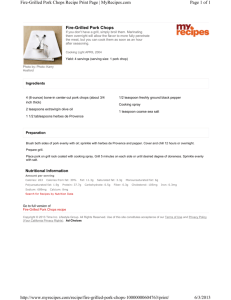Integrating Non-Family Executives into the Family Business
advertisement
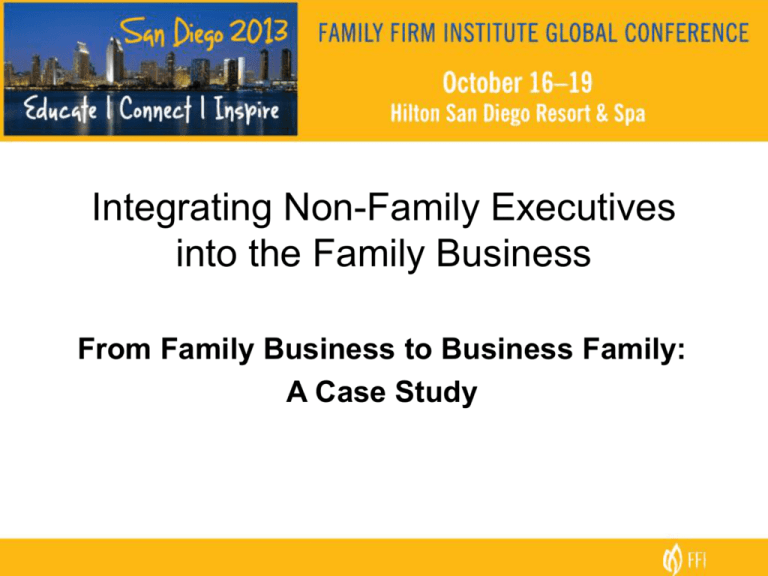
Integrating Non-Family Executives into the Family Business From Family Business to Business Family: A Case Study Clemens Family Corporation • $700m + annual revenue • 2,200 team members • 260 Shareholders – spanning 2nd - 6th generations • Over 115 years in operation • 4th Generation leadership • Clemens Food Group: – 9th largest hog production company in the U.S. • Clemens Development: – $80 million+ in real estate assets Established 1895 Top 10 Pork Suppliers – Daily Capacity 1. 2. 3. 4. 5. 6. 7. 8. 9. 10. Smithfield Foods, Smithfield, VA Tyson Foods (IBP), Dakota Dunes, SD Swift (JBS) Greeley, CO Cargill Pork, Wichita, KS Hormel, Austin, MN Triumph Foods, St. Joseph, MO Seaboard Farms, Shawnee Mission, KS Indiana Packing Co., Delphi, IN Clemens Food Group, Hatfield, PA J.H Routh, Sandusky, OH 115,400 76,775 47,000 37,800 37,300 20,000 19,800 17,000 10,600 4,200 Our Standing in the Meat Industry Top 100 Meat Producers in North America – 2012* 1. 2. 3. 4. 6. 14. 23. 35. 36. 43. 64. 74. 83. 97. Tyson Foods JBS USA Cargill Meat Solutions Smithfield Foods Hormel Foods Corp Perdue, Inc. Seaboard Foods Boar’s Head Johnsonville Sausage Clemens Food Group Dietz & Watson Bob Evans Farms XL Four Star Beef Monogram Food Solutions $33 billion (beef, chicken, pork) $31 billion (beef, chicken, pork) $18 billion (beef, chicken, pork) $13 billion (pork) $ 8 billion (beef, turkey, pork) $ 3 billion (chicken, turkey) $ 2 billion (pork) $813 million (beef, chicken, turkey, pork) $800 million (pork) $735 million (pork) $400 million (beef, chicken, turkey, pork) $334 million (pork, turkey) $300 million (beef) $207 million (beef, chicken, pork, turkey) *Meat & Poultry Magazine, March 2013 DWB Background… • Joined Clemens Family Corporation in 1987 – Initially began as Controller – Promoted to Treasurer in 1995 – Became CFO in 2002 • 7+ years in Public Accounting prior to joining CFC – 4 years with a regional public accounting firm – 3 years with Price Waterhouse • Received my MBA in Finance in 2004 JBW background… • • • • Joined Clemens Family Corp in 2000 15+ years in Management Consulting Formerly with Ernst & Young, Inc. Magazine Focused on growth strategies in family/privately held middle-market companies How we met, Circa 1999… The S-Curve Stage I Stage II Stage III 1999 a changing REALITY 10 Financial Performance Dropping Costs increasing faster than revenues Capital projects not yielding return on investment Sales flat Net earnings and return on capital declining 11 Value of HQM Declining Return On Net Assets from 1993-1998 12% 10% 7% Median of Group Hatfield Quality Meats Cost of Capital 12 Sales have increased, but the bottom line has decreased! Fiscal 1998 Fiscal 1988 Sales $ $379.3 $214.8 Investment $115.8 $54.3 Employees 1538 880 Net Income $ $6.7 $7.9 Net Income % 1.77% 3.67% ($ in millions) 13 Transition Issues circa 1999 • Multiple family members active in the business in “leadership” capacity • Family members over-identified with the business • Culture of Entitlement and loyalty trumped performance and accountability • Philanthropic giving (as % of sales) was declining • Decision-making paralysis Attempts at Making Change • • • • First Attempt…mid-90’s CEO engaged a Strategy consultant Failed due to lack of buy-in with entire team Never got to root of the problem This Time Around…Consulting Projects • • • • • Vision and Strategic Priorities Balanced Scorecard Capital Project Rationalization Performance Management One year later: –“This isn’t going to work…” Choices Do nothing, and stay the same Sell the business Make dramatic change Succession Planning Committee • Goal was to map out an organizational structure that was best for the business, not for the family • Unanimous agreement was required from the committee, and a majority vote from the Voting Trusts • Facilitated confidential sessions over three months • Looked at positions, not people • “Are you doing what’s right, or what’s easy?” There was not enough room for all the family members to be at the top Family Business Vs. Business Family What’s the Difference? Family Business Business Family • Family Harmony • Loyalty • Tradition • Performance • Competitiveness • Profitability Decision Criteria Family Business Complacency Performance expectations based on objective factors Non-Performing Business Performance expectations based on cash needs of owners How we Define Shareholder Value at CFC • • • • • Increasing Stock Value Dividends Liquidity Philanthropic Giving Connectivity to the business • 4 out of 5 take cash – this requires cash/performance – Pursuit of Harmony vs. performance – Harmony is often a by-product of performance “Family Business” to “Business Family” Board of Directors OUR Owners’ Advisory TRUST TRIANGLE Council Management The Aftermath… • Family members were stunned, some felt betrayed • Family business leaders were designated to manage the family drama behind the scenes • It took a great deal of intestinal fortitude Results 12 Year Average as a Family Business CAGR 12 Year Average as a Business Family CAGR Business Revenue 4.6% Revenue Growth 5.8% Operating Income 11.5% Free Cash Flow 10.9% Family Operating Income 0.5% Focus Free Cash Flow -2.2% CFC Stock Growth Since 2000 350 300 250 200 150 100 50 0 Putting Stock Growth in Real $ • CFC shareholder has $150,000 of stock in 2000 • That CFC stock is now worth $1,248,000 in 2013 • Cumulative gain of 732% • CAGR of 17.7% DWB perspective: - As a long-time inside non-family executive • • • • • 2 different approaches to the business Politics Emotions All jobs on the line Relationships JBW Perspective – Should I Join? • Hiring decision – From the company’s perspective • Objectivity • Outside experience (vs. insular) • Strategy/leadership expertise • Catalyst to get hard things done The Hiring Decision • From my perspective – A look under the hood – Established relationships – Proved the future stability of the company – Lifestyle change • From both perspectives – Trust – Shared Values Lessons • An objective outsider is extremely helpful in navigating tough decisions • Know when to push, when to hold back • Trust is critical • Timing and readiness is everything Tips for Hiring Outside Executives 1. Be absolutely clear on defining decisionmaking scope and authority – – – New decisions may fly in the face of “the way we did things” No more fuzzy lines Get everyone on board with the role and authority Tips for Hiring Outside Executives 2. Get Other Family Members on Board – – – Critical mass of support prior to starting Share in the vision of the new leader’s role Deal with sabotage attempts up-front Tips for Hiring Outside Executives 3. Expose the Sacred Cows – – – Admit to the slush funds Don’t expect an outside exec to accept without question Discuss what is off-limits, and what is up for discussion Tips for Hiring Outside Executives 4. Identify the Cultural Non-Negotiables – – – – Preserving the culture is critical to the organization Cultural fit often exceeds skill level requirement Write down the unwritten rules Use cultural fit as interview screening mechanism Contact information and resources • Jim Wood, 215-368-2500 x8331 jwood@clemensfoodgroup.com • Dave Budnick, 215-647-6399 daveb@clemensfoodgroup.com • Resources: – “The Next Level: Essential Strategies for Achieving Breakthrough Growth” (Perseus Press, 2000) – “Business Family vs Family Business” Family Business Magazine, Jan/Feb 2013 – “The Struggle from Family-First to Business-First” Kellogg School of Management Case Study
